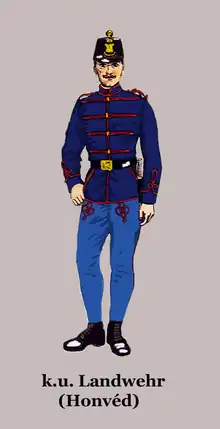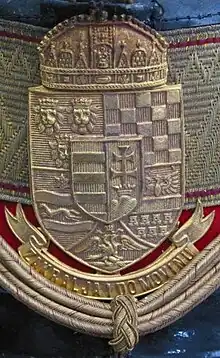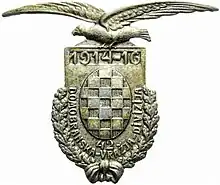Royal Croatian Home Guard
The Royal Croatian Home Guard (Croatian: Kraljevsko hrvatsko domobranstvo, Hrvatsko-slavonsko domobranstvo or Kraljevsko hrvatsko-ugarsko domobranstvo, often simply Domobranstvo or Domobran in singular, in German: Croatisch-Slawonische Landwehr) was the Croatian-Slavonian army section of the Royal Hungarian Landwehr (Hungarian: Magyar Királyi Honvédség), which existed from 1868 to 1918. The force was created by decree of the Croatian Parliament on December 5, 1868, as a result of the Croatian–Hungarian Settlement.

| Kraljevsko hrvatsko domobranstvo Royal Croatian Home Guard | |
|---|---|
 Home Guard Cap Badge | |
| Active | 1868–1918 |
| Country | |
| Branch | Common Army |
| Motto(s) | Za kralja i Domovinu (For King and Homeland) |
| Engagements | World War I |
| Commanders | |
| Notable commanders | Svetozar Borojević Stjepan Sarkotić |
The settlement specified four conditions:
- Croats would serve their military service within Croatia
- Military training would be conducted in Croatian
- Cadet and Domobran academies would be formed
- Croatian military units could take on Croatian names
Formations and units
The Home Guard initially consisted of 8 squadrons, garrisoned in 6 town:
- 79th Home Guard Squadron (Varaždin)
- 80th Home Guard Squadron (Zagreb)
- 81st Home Guard Squadron (Virovitica)
- 82nd Home Guard Squadron (Vukovar)
- 29th Home Guard Squadron (Varaždin)
- 30th Home Guard Squadron (Varaždin)
- 31st Home Guard Squadron (Vinkovci)
- 32nd Home Guard Squadron (Vinkovci)
Following a reform, it was reorganized into 8 battalions each garrisoned in a different town:
- 83rd Home Guard Battalion (Sisak)
- 84th Home Guard Battalion (Bjelovar)
- 87th Home Guard Battalion (Gospić)
- 88th Home Guard Battalion (Ogulin)
- 89th Home Guard Battalion (Švarča)
- 90th Home Guard Battalion (Glina)
- 91st Home Guard Battalion (Nova Gradiška)
- 92nd Home Guard Battalion (Mitrovica)
Following a second reform, it was reorganized into 5 regiments, each in 5 major cities:
- 25th Home Guard Infantry Regiment (Zagreb)
- Josip Broz Tito served in this regiment (German: k.u. Honvéd-Infanterieregiment Nr. 25).
- 26th Home Guard Infantry Regiment (Karlovac)
- 27th Home Guard Infantry Regiment (Sisak)
- 28th Home Guard Infantry Regiment (Osijek)
- 10th Home Guard Cavalry Regiment (Varaždin)
Commanders
- Count Miroslav Kulmer (1869–1875).
- Dragutin Višnić (1875–1880).
- Milan (Emil) Musulin (1881–1890).
- Matija Raslić (1890–1893).
- Eduard Lukinac (1893–1897).
- Josip Bach (1897–1901).
- Ðuro Ćanić (1901–1903).
- Radoslav Gerba (1903–1907).
- Svetozar Boroević (1907–1912).
- Stjepan Sarkotić (1912–1914).
- Ivan Salis Seewis (1915).
- Anton Lipošćak (1915–1916, 1917).
- Luka Šnjarić (1916–1917).
- Mihael Mihaljević (1917–1918).
- Teodor Soretić (1918).
World War I

The 42nd Home Guard Infantry Division consisting of the 25th, 26th, 27th and 28th Home Guard Infantry regiment under the Command of Stjepan Sarkotić took part in the battle against Serbia in August, 1914 together with the 104th Landsturm (pučko-ustaška) Brigade under the Command of Theodor Bekić.[1] In late 1918, elements of various Royal Croatian Home Guard regiments took part in occupation of Međimurje.[2]
Legacy
During World War II, the Independent State of Croatia was formed and its regular army was also called the "Croatian Home Guard". It existed from April 1941 to May 1945.
On 24 December 1991, during the Croatian War of Independence, a part of the Croatian Army was formed that was also called the "Home Guard" ("Domobranstvo"). It ceased to exist in a 2003 reorganization.[3]
References
- "OOB Serbia". www.austro-hungarian-army.co.uk. Archived from the original on 2002-02-11.
- Vuk, Ivan (2019). "Pripojenje Međimurja Kraljevstvu Srba, Hrvata i Slovenaca: Od neuspjeloga pokušaja 13. studenog do uspješnoga zaposjedanja Međimurja 24. prosinca 1918. godine" [The Annexation of Međimurje to the Kingdom of Serbs, Croats and Slovenes: From the unsuccessful attempt on 13 November to the successful occupation of Međimurje on 24 December 1918]. Časopis za suvremenu povijest (in Croatian). Zagreb: Croatian Institute of History. 51 (2): 507–532. doi:10.22586/csp.v51i2.8927. ISSN 0590-9597. S2CID 204456373.
- "20. Godina od osnivanja Domobranskih postrojbi HV-a | Braniteljski portal". www.braniteljski-portal.hr. Archived from the original on February 29, 2012.

